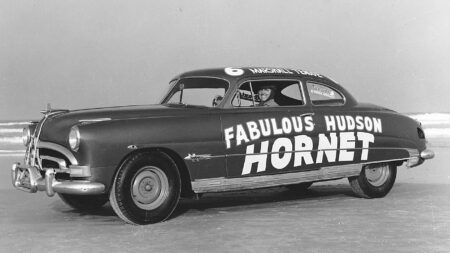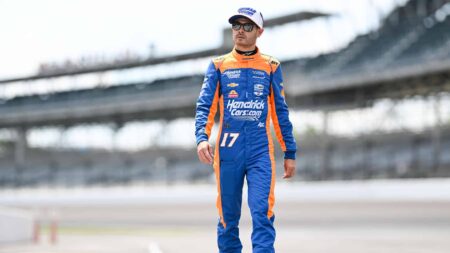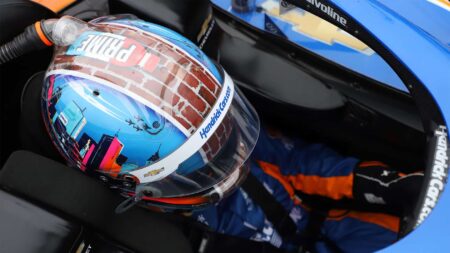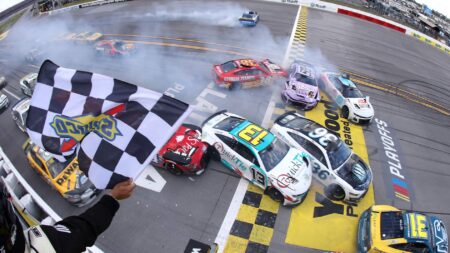
The real-life Hudson Hornet: story of a NASCAR icon
The massively successful Cars Disney film made Doc Hudson popular with fans young and old – James Elson tells the story behind the Hudson Hornet NASCAR it was based on
With seven races to go in NASCAR’s 36-round Sprint Cup ahead of this weekend’s meeting in Kansas, the title battle remains wide open. This year’s title contenders include defending champion Jimmie Johnson, former champions Jeff Gordon, Tony Stewart and Kurt Busch, plus Kyle Busch, Kevin Harvick and Carl Edwards, who have all won second-division Nationwide championships.

Also qualifying for this year’s ‘Chase for the Cup’ over the final 10 races are 2003 champion Matt Kenseth, Ryan Newman, Denny Hamlin, Brad Keselowski and NASCAR’s most popular driver, Dale Earnhardt Jr.
It’s easy to criticise NASCAR but the fact remains that it enjoys a more impressive depth of field than any other form of racing and is by far the big dog of American motor sport. NASCAR’s reach in the huge number of races it runs plus its at-the-track audience and massive TV time puts it in a class of its own, totalling more than the rest of the diverse world of American racing put together. NASCAR has also built a comprehensive ladder system reaching down to the grass roots and providing a way forward on a professional path for young drivers, mechanics, engineers and teams.

All this has evolved slowly but steadily over the decades. While other sanctioning bodies have squabbled for control of different forms of the sport, diminishing rather than building the ladder systems that used to exist in open-wheel and sports car racing, NASCAR has done the job well and filled the void vacated by others.
Elsewhere NASCAR continues its glacially slow technical evolution, with fuel injection set to replace carburettors next year in the premier Sprint Cup series and new sheet metal coming in 2013 when the cars should look more like Chevrolets, Fords, Dodges and Toyotas than in recent years with the Car of Tomorrow spec racer.
NASCAR has been working for a couple of years on the move to fuel injection and will adopt a McLaren ECU and Bosch injectors as part of its 2012 package. The new system will debut at next February’s Daytona 500 and become standard in the Sprint Cup. The teams have become adept at getting the most out of their carburettors and everyone seems to agree that the engines will make a bit less horsepower with fuel injection. At the same time fuel mileage should improve, and no doubt it won’t take long for the teams and manufacturers to regain the lost power.
McLaren supplies ‘spec’ ECUs to both Formula 1 and IndyCar, of course, while Bosch’s record and experience with fuel injection is unparalleled. “Having McLaren ECUs made a lot of sense for us,” said NASCAR’s vice-president of competition Robin Pemberton (below). “We interviewed a lot of manufacturers, large and small, but nobody else could match their record of success with providing a box to other major series. Their lack of failure rate and their commitment to do what it takes to help regulate the sport is important to us.

“Right now Bosch is the only injector we’ll allow and the O2 sensors will be Bosch. Those are things McLaren recommended for their system and we don’t see any issues with either Bosch or McLaren supplying everyone. They have strong track records in the industry and we have complete confidence that both can do the job.”
NASCAR has also been working closely with the manufacturers towards a new look for 2013. Sheet metal will be adopted in the Cup series to allow for more brand recognition, as with this year’s Nationwide car. “The safety structure will remain the same,” said Pemberton. “But all the sheet metal will be different. We haven’t had this level of engagement by the manufacturers since perhaps the ’80s.”

It may not be as robustly healthy as it was a few years ago, but NASCAR continues to boast a full field of 43 cars and a steady stream of new American talent anxious build a reputation against the likes of Gordon, Johnson, Stewart, Harvick, Edwards and the Busch brothers. Thanks to the many failures of both American open-wheel and sports car racing, NASCAR’s stars personify US motor sport today.

The massively successful Cars Disney film made Doc Hudson popular with fans young and old – James Elson tells the story behind the Hudson Hornet NASCAR it was based on

NASCAR star Kyle Larson is attempting 'The Double' this Sunday, driving the Indianapolis 500 and Coca-Cola 600 on the same day – but several factors could stand in his way

'The Double' is a challenge like no other in motor sport – we look at the brave racers who've taken on the Indianapolis 500 and Coca-Cola 600 on the same day

NASCAR has aimed big with its new Drive to Survive Netflix imitator Full Speed: can the docudrama match its lofty ambitions?